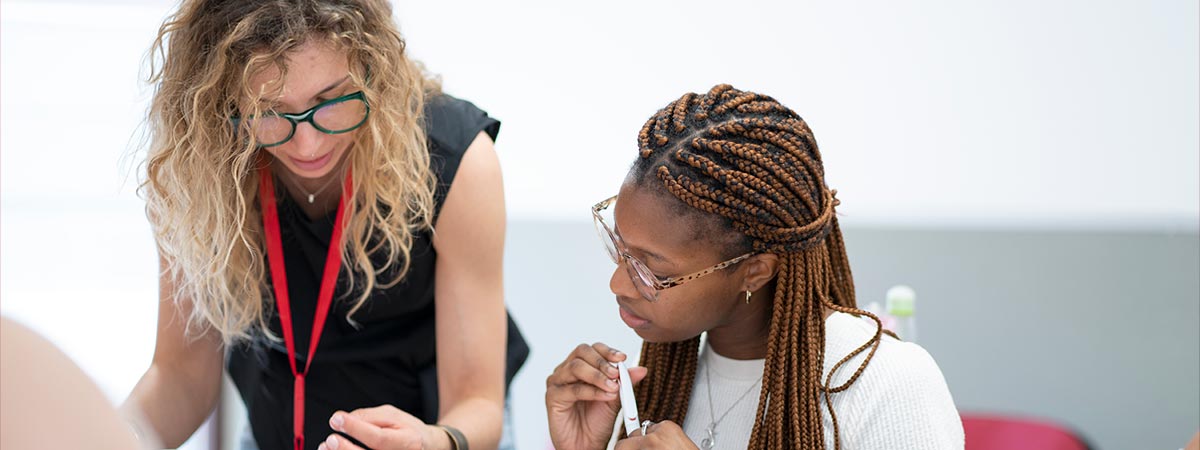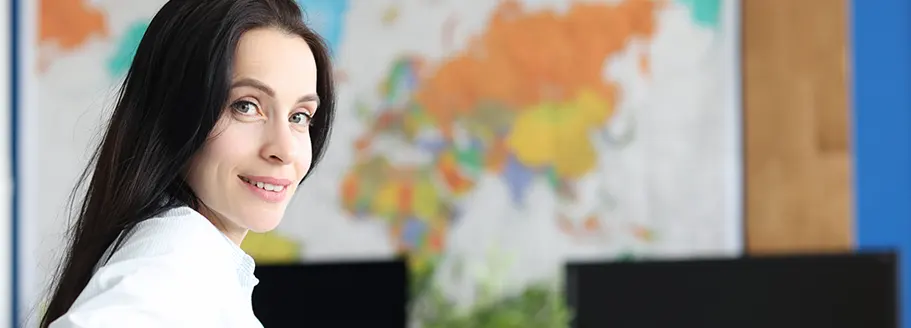Master’s Degree in Research in Universal Design for Learning and Inclusive Education

Application of neuroscience to Universal Design for Learning
The Master's Degree in Universal Design for Learning (UDL) emerges from the intersection of learning theories, technological advancements, and insights from neuroscience, addressing a pressing social imperative: ensuring the right to quality education for all children, irrespective of their social circumstances, individual traits, or family and cultural backgrounds.
Students will acquire advanced knowledge, skills, and competencies in Information and Communication Technologies (ICT), active methodologies, and other pivotal elements for fostering innovation and inclusivity in teaching and learning processes.
This program meets the demand from educators and education professionals for specialized training in diversity management and for fostering research that advances scientific understanding, as well as for designing, implementing, and validating UDL methodologies.
Let’s talk about Education
Second chapter of our video podcast series on education. In this episode, we delve into emotions in the classroom and their impact on the educational process.
Why study the Máster en Investigación en Diseño Universal para el Aprendizaje y Educación Inclusiva

More than 25 years of teaching experience
Nebrija University stands as a beacon in Education research and teacher training, boasting quality upheld by top rankings and over 25 years of training expertise.

Teaching faculty of excellence
Study alongside seasoned professionals and esteemed doctors with extensive experience, both professionally and in research, in the realm of education.

100% Online Program
Our Master's program is entirely virtual, enabling you to seamlessly integrate your studies with your professional and personal commitments.

Doctorate in Education and Cognitive Processes
Dive into our program designed to generate fundamental and practical knowledge, exploring individual differences and providing an educational approach that embraces the multidimensional nature of diversity.
Curriculum
All our degrees and curricula adhere to the latest legislative guidelines, having undergone verification by the National Quality Assessment Agency.
Each student is required to complete 60 credits
First Semester 30 ECTS
From October to January, both included- 4 ECTS | Culture and Inclusion Policy in Educational Centers
- 4 ECTS | Neuroscience, Education, and Inclusion
- 6 ECTS | Active Methodologies and ICT
- 4 ECTS | Universal Design for Learning (UDL): Guidelines for Its Introduction in the Curriculum
- 6 ECTS | Educational Research and Action
- 6 ECTS | UDL Research Seminars
Second Semester 30 ECTS
From January to June, both included- 6 ECTS | Means and Resources of Representation
- 6 ECTS | Means and Resources of Action and Expression
- 6 ECTS | Means and Resources of Involvement
- 12 ECTS | Master's Final Research Project
More Academic Information
Official Degree:Master’s Degree in Research in Universal Design for Learning and Inclusive Education
Center responsible:School of Language and Education
Available places: 200
Type of Education:: Online
Languages: Spanish
Academic year in which it was implemented: 2024/2025
Duration: 1 year. From October to June
University Services: [+info]
Learning Outcomes
Knowledge- K1. Gain advanced understanding of diversity, educational inclusion, and the universal design of learning. Learn the methodologies that ensure quality education in alignment with the Sustainable Development Goals.
- K2. Recognize the impact of neuroscience on education by understanding cognitive processes and their role in addressing diversity.
- K3. Distinguish, at an advanced level, the methodological strategies and digital resources that enable universal design.
- K4. Analyze innovative teaching models and emerging research perspectives in inclusive education to reduce inequalities, ensure equal opportunities, and provide universal access for all individuals.
- K5. Understand the process of designing research in line with the scientific model within the field of inclusive education.
- K6. Differentiate, at an advanced level, the latest trends and research related to teaching models for inclusive education.
- K7. Identify and explain, at an advanced level, the use of tools and resources that fulfill the three principles of Universal Design for Learning.
- K8. Reflect on the principles and models of inclusive education to address the universality of education.
- S1. Construct theoretical foundations on complex learning situations in challenging and exclusionary educational contexts. This will enable the design of research models based on Universal Design for Learning (UDL), grounded in educational policies and emerging models for diversity inclusion.
- SS2. Identify the key cognitive processes in universal design and their impact on educational inclusion and 21st-century challenges, through the study of scientific contributions.
- SS3. Evaluate the role of Information and Communication Technology (ICT) and the use of active methodologies to enrich research around universal design.
- SS4. Plan the presentation of advanced ideas, complex procedures, and detailed action research reports in the field of Universal Design for Learning to effectively integrate inclusive actions into the curriculum.
- SS5. Master advanced specialized bibliographic search techniques, and research techniques and instruments that ensure the proper development of a research project on the master's subjects.
- SS6. Utilize, at an advanced level, the most relevant models and methods for collecting, analyzing, and interpreting information to gain a comprehensive research perspective on educational inclusion.
- SS7. Examine and implement, at an advanced level, tools and resources that fulfill the three principles of Universal Design for Learning.
- C1. Utilize the knowledge gained from the Master's program to develop, present, and defend a research project related to educational inclusion and universal design.
- C2. Link the latest advancements in neuroscience to the learning process for personalized student attention.
- C3. Advocate for various methodologies, strategies, and digital tools to achieve inclusive education, grounded in the latest research advancements for teaching based on active methodologies and the digital transformation of educational institutions.
- C4. Demonstrate research competence in diversity attention, educational inclusion, and universal design of learning, establishing methodological guidelines for their proper inclusion in the educational curriculum.
- C5. Execute action plans and research projects in the field of inclusive education and universal design for learning.
- C6. Effectively disseminate and communicate research results in the field of inclusive education to various audiences, including professionals, institutional managers, and the general public.
- C7. Select and evaluate appropriate means and representation resources to promote diverse options in the presentation of information (Principle I: "What is learned").
- C8. Choose and value different means of action and expression to provide opportunities for all students to demonstrate their learning (Principle II: "How it is learned").
- C9. Select and evaluate appropriate means and resources of engagement to foster student motivation and commitment (Principle III: "Why learning occurs").
Online Study
The Master's degree program is delivered entirely online, employing a variety of educational strategies. Among these, video conferencing sessions are particularly noteworthy, serving as platforms for content presentation and facilitating both individual and group work through diverse activities.
More information: Pedagogía digital: Metodología
Admission
Admission Process
Our Master's degree program adheres to the current access and admission regulations as per RD 822/2021, dated September 28.
The ideal candidate for this program is a university graduate or equivalent (bachelor's, associate's, or master's degree) in the fields of education, such as Early Childhood or Primary Education, Pedagogy, or Psychopedagogy. Given the multidisciplinary nature of our program, students who have completed the Master's Degree in Teacher Training for Compulsory Secondary Education and Baccalaureate, Vocational Training and Language Teaching, or hold the Teaching Aptitude Certificate (CAP), are also eligible to apply.
The University's Promotion and Admissions Department is dedicated to providing personalized information to prospective students, facilitating the application process, and monitoring the progress of candidates. This department has specialists for each program who are trained to respond to inquiries via email, phone, or fax. These contact details can be found in our advertisement material.
Candidates also have the opportunity to schedule an interview with the Academic Director of the Master's Degree in Research in Universal Design for Learning and Inclusive Education, or with their designated representative.
Nebrija University offers accessible information systems and procedures designed to welcome and guide new students, facilitating their integration into their respective university courses. For students with specific educational needs due to disabilities, the University provides suitable support and advisory services, which will assess the need for potential curriculum adaptations.
To further assist new students in their transition to the University and their chosen degree, we have developed a specific orientation procedure. For Bachelor's degrees, an Introduction and Adaptation Course to the University is organized and conducted before classes commence, with various contact activities scheduled. For master's degrees, this is replaced by what we call 'Week 0'. During this week, newly admitted students are introduced to the University's structure and the specifics of the degree program they have enrolled in.
In accordance with the current access and admission regulations of RD 822/2021, dated September 28.
In compliance with Article 18 of Royal Decree 822/2021, the Antonio de Nebrija University explicitly reserves 5% of places in its official Master's degrees for students who have a recognized degree of disability equal to or greater than 33%.
The Antonio de Nebrija University provides accessible information systems and procedures to welcome and guide new students, facilitating their integration into their respective university courses. For students with specific educational needs due to disabilities, the University offers appropriate support and advisory services. These services assess the need for potential curriculum adaptations, alternative study paths, or itineraries.
The University's Student Guidance Service, known as the Psychopedagogical Orientation Office (GOPP), offers students the opportunity to receive comprehensive and individualized guidance. This service promotes optimal academic performance and holistic personal and professional development (https://www.nebrija.com/vida_universitaria/servicios/gabinete-orientacion-psicopedagogica.php).
The GOPP works on an individual basis to adapt the potential conditions of the subjects to the specific needs of students with disabilities.
For the purposes of pre-admission and admission, candidates will be evaluated on a scale of 0 to 10 points. This evaluation will consider the following criteria and their respective weightings:
- Academic Record [30%]:
The candidate's previous academic achievements will be taken into account. - Structured Personal Interview [60%]:
The candidate's suitability for the intended course of study will be assessed. This assessment will be based on their experience, knowledge, and the technical and professional skills necessary for successful completion of the studies. Factors such as motivation, attitude, and other personal aspects contributing to the candidate's suitability for the chosen course will also be evaluated. The interview may be conducted in the language of instruction and may be written. - Candidate's Presentation Document [10%]:
In a personally prepared document, the candidate will articulate their motivation and interest in the chosen course of study. They may also include any other personal circumstances they deem relevant to the selection process.
If Spanish is not the candidate's first language, they must provide proof of Spanish proficiency at a B2 level, as evidenced by an accredited certificate.
Once all available spots are filled, additional interested applicants will be placed on a waiting list. Any vacancies that arise before the start of the course will be filled by students from this waiting list, in the order of their evaluation scores from the pre-admission and admission process.
To be eligible for this Admission Process, candidates must provide proof of a university degree or equivalent (such as bachelor's, associate's, or master's degrees) in the field of education: Early Childhood or Primary Education, Pedagogy, or Psychopedagogy. Given the multidisciplinary nature of the program, students who have completed the Master's Degree in Teacher Training for Compulsory Secondary Education and Baccalaureate, Vocational Training and Language Teaching, or the Teaching Aptitude Certificate (CAP) are also eligible to apply for the Master's Degree.
Upon completion of the admission tests, the Admissions Committee reviews the results and the documentation submitted by the candidate, and then approves or rejects the application. The candidate will receive written information about their admission status, the process for formalizing their registration in the Program, and the final documentation they must submit, duly legalized. The commission consists of the Vice-rector for Academic Organization and Teaching Staff, the Director of University Development, the Dean of the School, the Registrar of the University, and any other person responsible for the Department of Education to whom authority may be delegated.
The admission tests are evaluated as part of a comprehensive strategy aimed at understanding the applicants' characteristics. This evaluation determines whether the candidate possesses the necessary motivation, training, knowledge, skills, aptitudes, communication abilities, extracurricular activities, and future interests to be admitted as a candidate in Nebrija University's programs.
Employability
Career Opportunities
This postgraduate program is oriented towards research, shaping future graduates with scientific knowledge to engage in research activities and gain specialized expertise in the field. Graduates will be equipped to undertake educational research projects focusing on educational inclusion and Universal Design for Learning.
The acquired skills will enable graduates to develop a research profile aimed at reformulating education. Armed with a conceptual framework and analytical tools, they will be adept at analyzing and evaluating curricular designs to identify learning barriers and propose inclusive teaching strategies.
The graduate will possess the profile of an educator well-versed in the principles of the Universal Design for Learning (UDL), capable of cultivating educational settings conducive to teaching across various modalities and learning environments. They will excel in selecting the most suitable resources, strategies, and methods to foster academic success for all students.
More Information about Internships in CompaniesYour Master’s Degree in Research in Universal Design for Learning and Inclusive Education
Visit all the Activities of the School of Language and Education

How Social Networks Influence Adolescents
Article published by Mónica Moreno, professor at Nebrija University, about the influence of social networks on students and their direct impact on the learning process.
See article
Emotional Education in the Classroom
Study conducted by the Institute of Emotional Intelligence and Applied Neuroscience on the implementation of emotional education in Spanish classrooms and its significance.
See articleLet's Talk about Education
First chapter of the video podcast specialized in Education where research processes and their application in neuroscience and the educational sector are examined.





